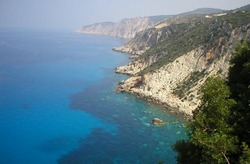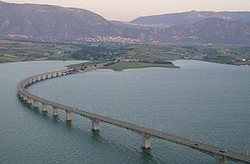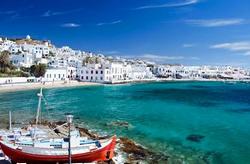 Greece, officially the Hellenic Republic, is a country in South-eastern Europe, on the southern tip of the Balkan Peninsula, the Eastern Mediterranean. In the list of the world's countries by their total area it ranks 97th out of 249 countries. The capital and largest city of Greece is Athens. Other large cities are Thessaloniki, Patras and Heraklion.
Greece, officially the Hellenic Republic, is a country in South-eastern Europe, on the southern tip of the Balkan Peninsula, the Eastern Mediterranean. In the list of the world's countries by their total area it ranks 97th out of 249 countries. The capital and largest city of Greece is Athens. Other large cities are Thessaloniki, Patras and Heraklion.
It has a long and rich history during which it had a great cultural influence on three continents - Europe, Africa and Asia. As the cradle of civilization Greece has affected and still affects a large part of history and current developments. Ancient Greece was the birthplace of democracy and philosophy, history, medicine, the Olympic Games, drama, tragedy and comedy.
Greece became an independent state in 1830. It has been a member of the European Union (former European Communities) since 1981, the Eurozone since 2001, and the NATO since 1952. It is a founding member of the United Nations (1945).
Where is Greece located?
Greece consists of a large mainland area, the southern end of the Balkans, which connects with the former continental Peloponnese with the Isthmus of Corinth, since ever since the construction of the Corinth Canal the Peloponnese is actually the island.
Which countries border Greece?
Greece shares land borders with Albania to the northwest, Bulgaria and the Former Yugoslav Republic of Macedonia (FYROM) to the north and Turkey to the northeast. It is surrounded by the Aegean Sea to the east, the Ionian Sea to the west and the Libyan Sea to the south. Greece holds the 11th place in the list of countries with the longest coastline with a coastline of 13,676 kilometres as it has many islands - about 2,500. Of these, only 165 are inhabited.
Which are the largest plains?
The largest plains are those of Larissa in Thessaly and of Giannitsa in Central Macedonia.
How is Greece divided geographically?
Geographically, Greece is divided into 9 regions, which are divided into 51 prefectures. These regions are:
- EPIRUS
- THESSALY
- THRACE
- CRETE
- MACEDONIA
- AEGEAN ISLANDS
- IONIAN ISLANDS
- PELOPONNESE
- CENTRAL GREECE







